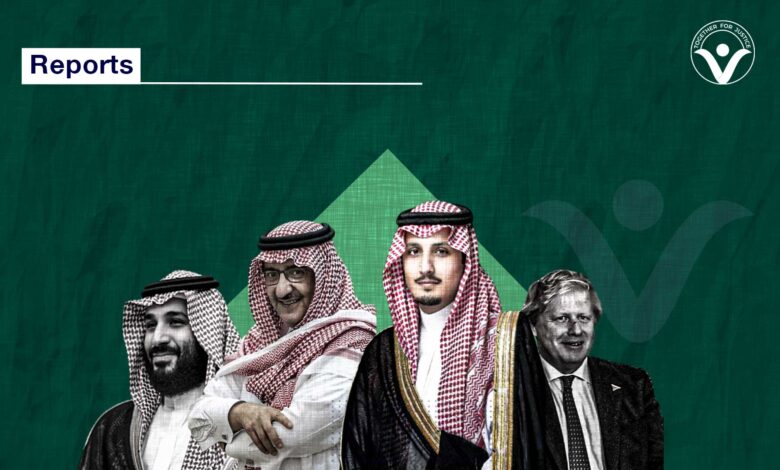Summary of the Press Conference: British MPs and lawyers to publish report revealing detention conditions of Saudi Princes

Fact Finding Report into the detention of Saudi Arabian Royals:
- Former crown prince Mohammed Bin Nayef
- Prince Ahmed Bin Abdul-Aziz
Chair:
- Crispin Blunt MP
Speakers:
- Layla Moran- MP
- Imran Ahmad Khan- MP
- Haydee Dijkstal- Lawyer
The aim of the Fact-Finding Panel (FFP) is to investigate and report the detention of detainees in Saudi Arabia, including health and conditions.
The FFP was commissioned by an NGO on behalf of Saudi citizens interested in the welfare of Saudi detainees. The FFP report was mandated to do the following:
i. Determine the location and nature of the Detainees’ detention including the conditions
ii. Determine if the Detainees have been allowed access to independent lawyers and family members
iii. Determine if the Detainees have been afforded adequate access to medical treatment whilst in detention
iv. Establish if the conditions in which the Detainees are being detained are compliant with provisions under Saudi Arabian and International Law and;
v. Prepare a report detailing their findings.
The FFP, in its fact-finding mission, reviewed the following material:
i. Evidence submitted directly to the FFP
ii. US State Department Country Report on Saudi Arabia – 2019
iii. Opinions from the United Nations (“UN”) Working Group on Arbitrary Detention
iv. UN expert joint statements
v. Reports from respected and credible human rights organisations
vi. News sources
vii. International and national legal instruments
Layla Moran- MP:

Both princes were arrested, in what seems to be a premeditated high jacking. Damage to both vehicles suggests that the princes were obstructed and taken forcefully from their car. They are currently being held in an undisclosed place. These places are not official holding cells, therefore there is little to no oversight. MBN as well as Prince Ahmad have been arrested without any grounds and have not been put in contact with any lawyers. This further proves that the disappearance of detainees is a systemic problem in the kingdom of Saudi Arabia, they’re using this arbitrary detention mechanism for all types of Saudi regardless of wealth and prestige. Reports online suggest MBN was attempting to block MBS’s rise to power. NGO groups as the FFP found no proof at all. Seems like MBS is trying to consolidate power.
Imran Ahmad Khan- MP:

MBN was held in solitary confinement for over 6 months in an undisclosed location. He was subjected to actions amounting to torture and cruel human conditions, in direct opposition to the Mandela rules and UN rules and regulations. After serving 6 months in solitary confinement, the 78-year-old was finally released from solitary confinement but is under the constant threat of going back into it if he does not release funds towards the Saudi kingdom specifically MBS.
There are a number of credible reports stemming from Saudi Arabia suggesting that political detainees are regularly tortured, amongst them being blindfolded, stripped naked, waterboarded, and sexually abused in draconian methods. These methods are said to have been practiced on both princes, as they continuously rejected our pleas to visit or contact both detainees.
In regard to the former crown prince, his health has drastically worsened since his arrest, he has gained a significant amount of weight, he has significant pain in his joints/knees and there appears to be evidence of damage to his feet. With him being diabetic, this could be fatal.
Haydee Dijkstal- Lawyer (she summarised the legal points):
In light of Saudi obligations in international laws, convention against torture, Arab league convention of human rights, and the Mandela Rules.
The rights affected include a guarantee for international standards for detentions ensuring the health and safety of inmates. The right to health care is the state’s responsibility and must be administrated at the same standard as it would to any citizen. Prisoners should also enjoy the right against all forms of torture, be it physical or mental.
The panel’s conclusion is to encourage Saudi Arabia to sign and uphold all basic human rights in the land. The FFP is going to take some concrete steps such as presenting the report to governments around the world, Encourage Saudi Arabia to accept the findings, and adopt the suggestions. The report will also be submitted to the UN general assembly and human rights council. Saudi Arabia has enjoyed a period of impunity. From the 20 Saudis involved with the death of Jamal Khashoggi to their numerous attempts at extrajudicial killings of activists around the world, including Canada, Norway, and Turkey.
The report found that the detention and treatment of both princes does not meet the required international standard. the conclusion one has to draw is that this is systematic and part of a pattern by the Saudi regime towards its citizenz. If two former Saudi princes can be treated with such little to no regard. degraded and beaten, it can only reflect the treatments an ordinary political prisoner would face. the conduct of the Saudi regime towards its citizens undermines its allies.
FFP Findings
On the basis of the evidence submitted to it the FFP makes the following findings on a balance of probabilities:
i. In violation of the KSA’s international legal obligations the Detainees are being held without charge. They have not been given the opportunity to challenge their detention and the necessity of their continued detention has not been reviewed by any court or tribunal. It is therefore highly likely that they are being arbitrarily detained. There is clear and concerning evidence that there is a systemic problem with arbitrary detention in the KSA which amounts to a serious violation of international law.
ii. The location(s) where the Detainees are currently being held remains unknown to their families and lawyers. It is likely that they are being detained in an unofficial location, rendering it almost impossible to establish whether the conditions in which they are being kept comply with national and international minimum standards.
iii. In violation of the KSA’s international legal obligations both Detainees have been detained incommunicado for periods of time during their detention. MBN was held in solitary confinement for at least six months following his arrest.
iv. In violation of the KSA’s international legal obligations the Detainees have not been allowed access to their lawyers whilst they have been detained.
v. In violation of the KSA’s international legal obligations and despite the fatal risks posed by the ongoing global covid-19 pandemic, there are real concerns that both Detainees have been denied access to appropriate and adequate medical care leading to a deterioration in their health. MBN has not been provided access to his personal doctor.
vi. In violation of international prohibitions against physical and psychological torture there are real concerns that through holding the Detainees in solitary confinement and in conditions very likely below the requisite minimum international standards, the Detainees have been subjected to cruel, inhuman, or degrading treatment.
vii. KSA has taken a minimalist approach in adopting and ratifying the normal international conventions underlying a nation state’s acknowledged obligations towards its own citizens. Those it has adopted bind it by reference to those it has not formally acceded to or ratified. However, the conclusion to be drawn by the lack of a comprehensive approach to the normal instruments of international human rights law in light of the evidence presented to this Panel is that this is deliberate. The KSA appears not to expect to observe obligations towards the rights of its citizens seen as standard elsewhere in countries with fully developed legal systems.
viii. The Saudi government does not welcome oversight of the Detainees’ conditions in detention.
FFP Recommendations
Following its review of the available evidence and Saudi Arabia’s legal obligations, the FFP makes the following recommendations:
- The independent Panel – and any other international organisations mandated to assess the well-being and rights of political prisoners and other detainees – should be granted urgent and unfettered access to visit the political prisoners and detainees in Saudi Arabia.
- Any criminal cases against the Detainees should be immediately reviewed by senior prosecutors. If a decision is made to proceed with any prosecutions, all steps should be taken to afford all fair trial and due process rights as required by Saudi Arabia’s international human rights obligations, and any reported violations of these rights must be fully and genuinely investigated and remedied before proceedings resume.
- Any mistreatment of political prisoners or other detainees should be halted with immediate effect and in accordance with international legal standards and human rights, in particular under the Mandela Rules, for the treatment and management of individuals in detention.
- All individuals in detention should be granted immediate access to medical care, including ongoing care or specialised care if required.
- All individuals in detention should be granted immediate access to independent legal advice as well as regular access to, and communication with, their legal representative for the provision of confidential instructions and/or the preparation of a defence case.
- All individuals in detention should be granted, with immediate effect, regular communication with and/or visits from family members and friends.
- The international community and other Governments should take any steps available under international law and before international bodies such as the UN Security Council, the UN General Assembly, the UN Human Rights Council, to raise instances of human rights violations against political prisoners and other individuals detained in Saudi Arabia, in order for such allegations to be fully investigated and remedied, and to encourage the Government of Saudi Arabia to fully comply with its international human rights obligations. This should include imposing Magnitsky –style sanctions.
- The international community and in particular the Governments of the G7 countries should require the KSA to address concerns over its commitment to uphold norms of international human rights law by ratifying the two most basic human rights instruments: The International Covenant on Civil and Political Rights and the International Covenant on Economic, Social and Cultural Rights.
- That any attempt by KSA to use Interpol processes towards its own citizens should be examined with pre-emptive scepticism until it has ratified the basic legal instruments of international human rights and the pattern of oppressive behaviour towards its own citizens has ceased.
- That the G7 nations and other members of the international community should suspend prisoner transfer agreements and extradition treaties with KSA and review all criminal justice agreements in light of the evidence being presented about the KSA’s unwillingness to meet its basic international legal obligations towards its own citizens.
- That the G7 nations and other members of the international community should review their laws around the manipulation and exploitation of social media platforms by state actors against individuals to require these platforms to try to prevent, help identify and at least not facilitate campaigns of public intimidation by state actors or unaccountable other groups or individuals who appear to be coordinated by state actors.
Read Also: Loujain Al-Hathloul at Risk of Receiving a Life Sentence




